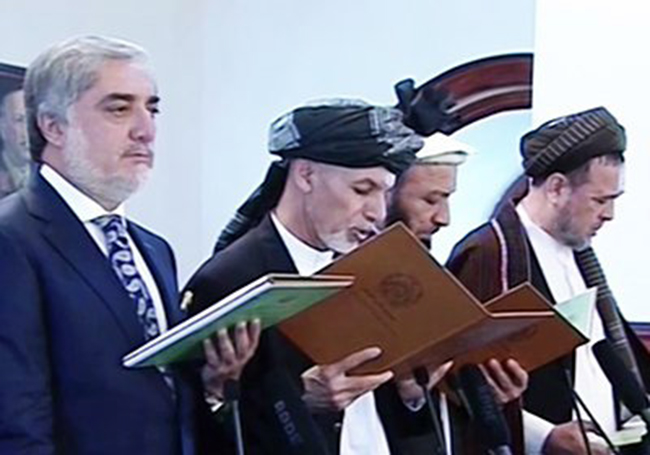The gap between state and nation has widened and there is a sense of deep mistrust in the air. On the one hand, the exchange of harsh rhetoric among political figures and on the other hand, reports about combatant and non-combatant casualties aggravate the political challenges and put an adverse effect on the mind of the public. The insurgency has increased to a great extent and the newly emerging insurgent groups, mainly the Islamic State of Khorasan Province (ISKP), seek firm foothold in Afghanistan to fish in troubled waters and put pressure on the government through spilling the blood of men, women and children.
With the establishment of the National Unity Government (NUG), Afghan nation hoped to heave a sigh of relief under democracy and put an end to the dark pages of historical episodes and fratricide. People dreamed a utopian world, which was empty of terrorism and human casualties, and democracy seemed to be a perfect panacea for their incurable wounds. The approval of the Constitution – which underlined the equality of men and women before the law and held respect to the United Nation’s Charter and the Universal Declaration of Human Rights (UDHR) – and the discourse on natural and inalienable rights and dignity filled the individuals with a sense of hope. Constitutionally, the government is supposed to empower women, protect the rights and liberty of the nation, form a civil society void of violence and bloodshed, develop the economic resources, etc.
Democracy also puts strong emphasis on individuals’ rights and freedoms and prohibits discriminations on the grounds of one’s race, sex and beliefs. There is no room for inferiority or superiority in democratic view and people are to treat one another with the spirit of brotherhood, practice upon the “Golden Rule” and tolerate one another patiently. The hegemony of the democracy has dominated the world, however, the true spirit of democracy is not practiced and the rights and dignity of people are violated on a large scale.
It is an undeniable fact that the post-Taliban Afghanistan has made great progress compared to the Taliban’s regime and Afghan women play key role in political, social and cultural arenas, but there are a lot to be done. Women still suffer from mental and physical tortures, deemed inferior and confined within traditional restrictions, mainly in the villages – where parochial mindsets hold strong sway. Afghan nation still sustains casualties and the guerilla fighters spill the blood of men, women and children without an iota of mercy. The conflict-related incidents have, reportedly, caused more than 8,000 civilian casualties in Afghanistan, including more than 2,500 deaths in the first nine months of 2016. Similarly, the ethnic minority groups fall victim to sectarian violence on the grounds of their caste, color or creed. Afghan soldiers bore the brunt of terrorism this year. Based on a recent report, Afghanistan’s security forces battling the resurgent Taliban have suffered around 15,000 casualties, including 5,523 fatalities in the first eight months of 2016. Hence the nation’s dream for peace and prosperity fell by the wayside and a vacuum for the spirit of democracy is widely felt among the public.
With the Taliban’s Omari Operation led by Mansour’ successor Mullah Haibatullah Akhundzada, the graph of fatalities heightened and it is said that of “407 districts, 258 districts were under government control or influence, 33 districts were under insurgent control or influence, and 116 districts were ‘contested.” In addition, the Taliban have infiltrated the Afghan soldiers and there were, reportedly, 101 insider attacks from January 1, 2015 to August 19, 2016 in which Afghan National Defense and Security Force (ANDSF) personnel turned on fellow security forces, killing 257 and wounding 125 others.
Despite the escalated militancy and high graph of fatalities, there are many challenges in the government’s apparatus. For instance, the harsh rhetoric among the high-ranking officials created a rift in the NUG and deteriorated the situation since the attention is redirected into self-interests rather than the political instability and planning an effective mechanism for counter-insurgency. It is believed that whenever the issue is muddied, the Taliban elements will try to exploit the situation in their own interests. Therefore, in the current sensitive condition, the officials and heads of NUG will have to strive for strengthening democracy and providing peace and prosperity for the nation.
It should be noted that disagreement among the officials will affect the nation negatively and channel their energy and attention to minor issues rather than terrorism which threatens the life of the citizens, including women and children. The officials are to boost the morale of the nation and soldiers through exercising unity and brotherhood.
Furthermore, the nascent democracy is to be strengthened through reinforcing the soldiers. It is highly painful to feel the vacuum for brotherhood in the military. Many soldiers lose their lives after being surrounded by the insurgents for days and left without help despite their persistent urge for support. In such a case, the officials are responsible. Those who neglect their duty in critical time must stand trial. Strengthening democracy without the implementation of law is impossible. All, including the officials, are equal in the eye of law and no one is supposed to violate it with impunity. It is hoped that the officials will bury the hatchet, focus on protecting the rights and liberty of the nation and counter insurgency with more effective mechanism.
Home » Opinion » Suffering under Democracy?
Suffering under Democracy?
| Hujjatullah Zia

